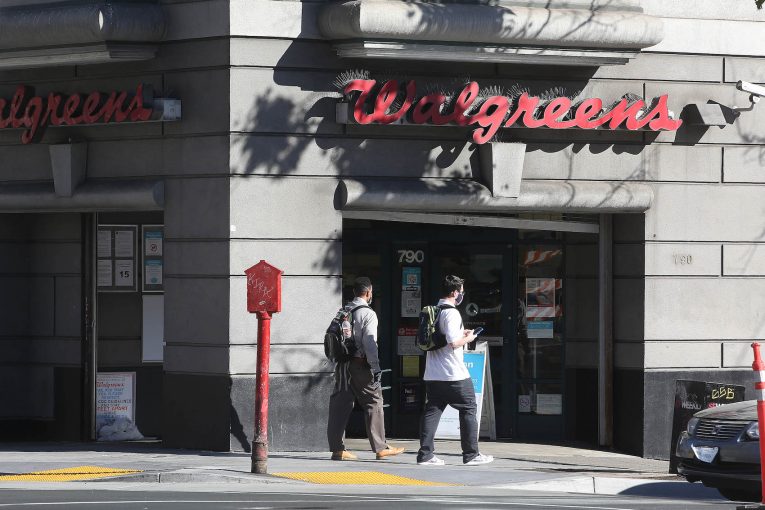

Photo by Lea Suzuki/The San Francisco Chronicle via Getty Images.
By The Vanguard Staff
SAN FRANCISCO, CA – Walgreens is having a bad few weeks – the San Francisco Market Street store was the site in late April of the shooting death of trans organizer Banko Brown by a Walgreens security guard, and this week Walgreens corporate agreed to pay nearly $230 million to the City in an opioid distributor lawsuit settlement.
SF City Attorney David Chiu, in a statement Wednesday, said “Walgreens will pay $229,610,000 over the course of 14 years, with the vast majority coming in the first eight years. Settlement funds will go towards addressing the opioid crisis in San Francisco.”
“This settlement stems from landmark litigation San Francisco brought in 2018 on behalf of the People of the State of California against the opioid industry for fueling the opioid epidemic. San Francisco sued multiple opioid manufacturers, distributors, and dispensers, but by the end of the liability trial in 2022, all defendants except Walgreens had settled,” said Chiu.
The City added, “After an 11-week liability trial, Judge Charles R. Breyer of the U.S. District Court for the Northern District of California ruled (here) in San Francisco’s favor and found Walgreens liable for substantially contributing to the opioid epidemic in San Francisco and perpetuating a widespread public nuisance.
“The Court found Walgreens over-dispensed opioids without proper due diligence and failed to identify, report, and halt suspicious orders as required by law. This was the first bench trial in the nation to result in a win for plaintiffs and the first bench trial to find Walgreens liable.”
The City Attorney’s Office said it collected more than $350 million in benefits, fees and cash from the opioid industry to “go towards opioid abatement and overdose prevention in San Francisco.”
“Opioids have wreaked havoc across our nation leading to immense suffering and untold damage,” said Chiu, adding, “Cities like San Francisco have shouldered much of the burden of the opioid epidemic. Thousands of attorneys, public health officials, and advocates have spent nearly two decades trying to hold the opioid industry accountable for creating this public health crisis…this historic agreement ensures Walgreens is held accountable for the crisis they fueled.”
“As we address the serious and continued impacts of fentanyl to our city, we can help many San Franciscans on their journey to wellness and recovery. San Francisco and the Department of Public Health will use these critical funds to save lives and bring people into treatment,” said Dr. Grant Colfax, San Francisco Department of Public Health Director.
“San Francisco stood up and took on Opioids defendants, persevered in complex and difficult litigation, and negotiated landmark settlements that will bring much needed funding to abate the opioid crisis in our community,” said Elizabeth J. Cabraser, Partner at Lieff Cabraser Heimann & Bernstein, LLP.
Cabraser added, “But, San Francisco did more than that, for itself and for states, cities and counties across the country: the public nuisance liability judgment San Francisco won in trial in federal court catalyzed additional nationwide opioid settlements with Walgreens, Teva, Allergan, Walmart, and CVS, totaling over $18 billion, and marks a turning point in all opioids litigation.”
The City noted the settlement began with City and County of San Francisco, et al., v. Purdue Pharma L.P., et al., filed in 2018 by the SF City Attorney, alleging “the corporate practices of opioid manufacturers, distributors, and dispensers fueled a widespread surge of opioid-related addiction and overdose in San Francisco, creating an ongoing public nuisance in the region.”
The City said it secured settlements with pharmaceutical company Endo ($10 million), $54 million with opioid manufacturers Allergan and Teva, $11 million from CVS, $6 million from Walmart, $45 million from opioid manufacturer Johnson & Johnson and distributors McKesson, Cardinal, and AmerisourceBergen. The City added it is “likely to receive funding from the bankruptcy estates of Mallinckrodt Pharmaceuticals, Purdue Pharma and the Sackler family.
“The evidence at trial established that from 2006 to 2020, Walgreens pharmacies in San Francisco dispensed hundreds of thousands of red flag opioid prescriptions without performing adequate due diligence. Tens of thousands of these prescriptions were written by doctors with suspect prescribing patterns. The evidence showed that Walgreens did not provide its pharmacists with sufficient time, staffing, or resources to perform due diligence on these prescriptions,” said Judge Breyer.
The court added, “Pharmacists experienced constant pressure to fill prescriptions as quickly as possible, and a shortage of resources to review them before dispensing. As a result of Walgreens’ 15-year failure to perform adequate due diligence, Plaintiffs proved that it is more likely than not that Walgreens pharmacies dispensed large volumes of medically illegitimate opioid prescriptions that were diverted for illicit use and that substantially contributed to the opioid epidemic in San Francisco.”
The City noted that, from 2006 to 2014, “San Francisco County saw 163,645,704 opioids distributed, enough for 22 pills per person per year. Between 2015 and 2020, San Francisco saw a 478 percent increase in opioid-related overdose deaths, and in a typical day at the Zuckerberg San Francisco General Hospital Emergency Department, approximately 25 percent of visits are opioid-related.
“San Francisco’s litigation was the fourth bellwether case in the federal opioid litigation proceeding involving more than 3,000 American cities, towns, and counties, bringing opioid manufacturers, distributors, and pharmacy chains to court for their role in creating the opioid epidemic.”